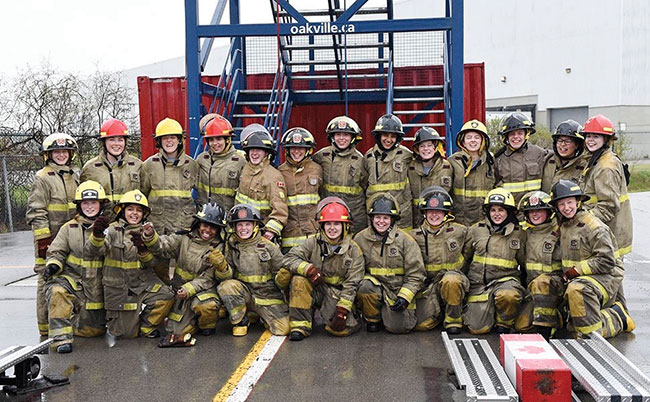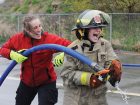
Fire departments across Canada are realizing the benefits of hosting firefighting training programs for young women. With women making up only 3%-5% of front-line emergency response roles, it’s no surprise that the main goal of these programs is to introduce firefighting to those who may not have considered the fire service as a career. “Being able to see yourself in those roles is difficult if you are a woman, or more so, a woman of colour,” explains Sue Jones, organizer of Camp FFIT (Female Firefighters in Training) of Ottawa Fire Services. (This program was truly the groundbreaking program in Canada.) “We run the camp to introduce the field to young women. Many women who have discussed how they got into firefighting share a story of someone planting the idea for them.”
Fostering more women to consider firefighting is a goal, but perhaps more specifically these programs create the ideal environment to build more skilled firefighters — who also happen to be women. Allison Vickerd, who runs Camp FFIT in London, Ontario, suggests that we have so much to gain in strengthening future candidates by offering them an initial training environment that is open and supportive where mistakes are expected and learned from. “Supporting an individual’s confidence and ability to be successful in the fire service will hopefully lead to less struggles down the road. Women have pushed through on their own for a long time and no one knew what they dealt with. If we can mentor them through the tough stuff earlier, the better,” she explains.
Here are the best tips that from camp organizers from across the country on how to build a successful program for all stakeholders involved.
1 Have a Vision. What type of program works best for your department? What age group or demographic would you like to invite to be a part of your department? Is it a one-day introductory program or multiple days? Do you partner with other emergency services to offer a glimpse into different careers? Maybe your program consists mainly of station tours, visiting dispatch and putting on gear. Maybe it’s a week-long program culminating in a live fire scenario. Some departments collaborate with other departments to offer a regional program, such as Camp Ignite in B.C.’s lower mainland or Camp Molly in the Halton region of Ontario. Programs take a lot of planning effort to get off the ground, so build something sustainable and relevant to your context.
2. Build a Team. Getting early support from the top is critical, but fire department management is by no means your only important team members. “Not everyone has to be a senior officer,” says Vickerd. “Even though newer firefighters might be intimidated by other ranks, through planning programs like this they will be stronger members of your department ready to take on more responsibility.“ Many programs enlist the volunteer help of firefighters who are in the lull period between attending fire training school and employment. During this time period, there is very little opportunity to get on the fire ground and do some work. These volunteers are future colleagues and you can assist in their development. Many participants are the daughters of firefighters who work in your department, so involve those parent firefighters as well, Vickerd says. They become the most vocal and strongest advocates for the program as they see the personal growth in their child as a result of their involvement.
3. Offer Realistic and Challenging Evolutions. Prepare to be surprised by the courage and risk-taking that your participants will take. Give them every opportunity to try, see and feel tools by making everything hands-on. It’s important for the participants to see women just like them lifting and using the equipment, so they know they can do the same. “They have no shortage of potential, just a shortage of appropriate encouragement and support,” says Andrea Speranza, organizer of Camp Courage and Captain at Halifax Regional Fire and Rescue Service.
4. Create Partnerships Inside and Outside Your Department.
Engaging exterior sources of funding can assist to offer a camp with little to no cost, which is important to reduce barriers for youth. Local businesses were more than happy to support the camp money program through the donation of meals, T-shirts, chair rentals, water bottles and bunker gear, says Monique Belair, Deputy Chief of Oakville Fire and organizer of Camp Molly. She suggests approaching businesses both inside and outside the fire service. Fire equipment suppliers and trainers have also donated their time to teach participants how to use their tools. Other programs partner with community organizations and school boards to promote and sponsor participants. City departments, especially city recreation, are important groups to make a camp a reality. They may be able to handle promotion, registration and payment through their infrastructure, leaving you to focus on what fire departments do best: developing high-quality and safe fire training.
Don’t forget to involve your local firefighter association or union. They likely have deep connections to community organizations and local businesses. Tap into the network of community relationships that associations work so hard to establish. Last, don’t reinvent the wheel. Fire Service Women Ontario can support and back your program, connecting you to people and resources to make your first camp successful. Be sure to acknowledge all partnerships on your flyers, publications and emails about the program.
5. Get your Messaging Right. Media is an important tool extending the value of your camp beyond the actual day of programming. Local media want to cover this feel-good story and the value of images of capable women firefighters and their supportive male colleagues is immeasurable. B.C.’s Camp Ignite even won a IAFF media award for their video footage of the program. For bigger departments, work with your corporate communications division to ensure your messaging is inline with corporate policy, says Monique Belair of Oakville. The fire department might struggle to keep up with the ever-changing world of social media communications, but your target demographic certainly isn’t struggling — so use these young people’s expertise. Provide opportunities for them to help you create visual content that will connect your fire department with their peers and the public at large. “I love seeing all the participants change their online profile pictures to active images of themselves in bunker gear,” says Pike Krpan, organizer of Camp FFIT of Hamilton Fire. “I can see the ripple effect as dozens of friends and family comment, like and share images of their loved one succeeding. That’s an inspiration to others.”
6. Mentoring Doesn’t End at the Close of Camp. While we tend to focus on delivering a dynamic and safe program, it’s at the end of camp that so much mentoring begins. Young women want to get connected to further training, education and potential career paths. Halifax’s Camp Courage offers bursaries to students who pursue emergency service-related education, and connect interested women to a mentor.
Mentoring doesn’t just mean the young women participants, either. A key benefit are the relationships that women firefighters with each other develop while teaching. Many women firefighters rarely if ever get the opportunity to work directly with each other — the leadership and real-life networking opportunities available at camps are almost impossible to access for women. “I am a better incident commander because of Camp Courage,” notes Captain Andrea Speranza. Keep encouraging their development by offering leadership opportunities in developing camps and seek out women-focused opportunities for them such as FSWO’s annual training symposium.
7. Be Inspired by the Youth. An important measure of long-term success is how many participants return to their communities as volunteer or career firefighters, or in other emergency service roles. Dozens across Canada have done so! But short-term success is also apparent. At Camp Molly, one participant had been involved in a serious car fire 10 years earlier. Participating in the camp was a pathway to overcome some of her fears and assist in PTSD treatment. The parent of another young participant from Pakistan noted that the camp allowed her daughter the opportunity to step outside her cocoon in Canada and fly. Many young women also return to camps as volunteers and mentor the next generation. Multiple organizers noted that if a young woman realizes she’s not cut out for firefighting as a result of the program, that’s also a success. The overall value of the program is in offering participants obstacles and supporting them to overcome them — an important life skill. While some would argue that this isn’t a career for anyone who has to be “invited” to the table, Sue Jones of Ottawa disagrees. “I contend that this career is for anyone with the strength to pursue it and commit to it.”
Print this page
Advertisement
- Out of the ashes: Letter from the President of FSWO
- An Interview with London Fire Brigade’s Commissioner


